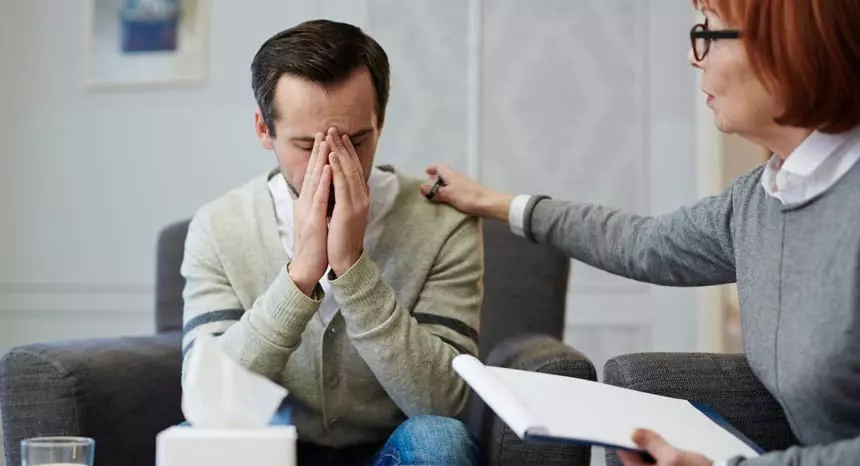Professional Services to Overcome Depressive Disorders
When you’ve had a horrible day, it’s normal to feel low for a bit. When tragedy strikes, people of all ages feel a profound sense of loss and despair. While some people have occasional bouts of sorrow, for others, lifelong depression is an everyday reality. If this sounds familiar, just know that depression treatment centers exist to help people just like you.
You may have tried altering your routine in order to alleviate your sadness. This is typical, but it might backfire. Self-medicating with drugs or alcohol is an option for some depressed people. Others simply wait, hoping that it’s a passing phase.
However, untreated depression can worsen over time. It has the potential to disrupt one’s personal and professional relationships. It is essential to research the right depression treatment center for therapy.
Keep reading to find out what Catalina Behavioral Health offers, and how to move into a life free from depression with their help!
24 Hour Mental Health Hotline – Call Now!
What Triggers the Need for Depression Treatment?
Depressive disorder is a kind of mental disorder. Those who suffer from it often lose interest in activities they previously enjoyed. The condition compromises all aspects of your mental and emotional health.
Negative mental and physical health effects might make it difficult, if not impossible, to do even the most basic of tasks. The experience might leave you feeling as though your life has no meaning.
When someone you care about notices that you seem down, they may try to give you a pick-me-up. You can’t just “shake off” depression. It may take a depression treatment center to begin feeling better.
What Happens at a Depression Treatment Center?

At a depression treatment center, professionals treat a variety of related mental health conditions. Each client receives a unique treatment plan that may include the following:
- Individual therapy
- Family therapy sessions
- Dual Diagnosis Treatment
- Prescription/Medication Management
- Cognitive Behavioral Therapy
- Advice for Post-Treatment
Much of your time in a residential depression treatment center will be spent in individual therapy, as this is frequently the first suggested type of treatment for individuals with depression. Therapists in a depression treatment center have received extensive training in methods that aim to alleviate the mental and emotional anguish that contributes to their clients’ sadness.
Your counselor can assist you in determining the source(s) of your depression and providing strategies for overcoming them. The following methods may be employed in individualized treatment to treat depression:
- Learning to recognize the mental, emotional, and behavioral patterns that keep you down
- Finding the causes of your sadness and working to fix them
- Educating you as to which parts of the problem you might be able to fix or enhance
- Restoring your ability to enjoy your life
- Those in depression treatment learn to deal with difficult situations and how to manage symptoms of mental illness without full relapse
You will participate in both individualized treatment and frequent group therapy. Those who participate in group therapy programs are able to relate to and gain insight from the experiences of others going through similar challenges.
This might give you a fresh perspective on your difficulties and make it easier to manage them. Participating in group therapy can help you develop stronger interpersonal and social abilities. The genuine friendships you establish with others going through the same process of overcoming depression will last a lifetime.
How to Treat Depression Alongside Substance Abuse

Alcohol and drug misuse are common coping mechanisms for those suffering from depression, even or perhaps particularly for those who function at a high level while depressed. Maybe you’ve turned to drugs in the past to alleviate your despair or help you forget about your problems.
Unfortunately, when narcotics are added to depression, they just make the client feel worse. As a depressant, alcohol does this more rapidly. The use of drugs or alcohol can bring on depression, even in those who have never experienced it before.
Depression treatment center counselors and employees receive specialized training in treating clients with both substance abuse and mental health problems. Valid treatments are used to combat symptoms of dual diagnoses. Examples of treatment for depression and substance abuse include:
- Depression treatment on an individual basis
- Treatment for substance abuse on an individual basis.
- Co-occurring disorder treatment groups can address both problems at once.
- Family sessions with counselors
- Holistic or alternative therapies
Medication-Assisted Therapy
Medication can be useful for certain clients. Treating depression with antidepressants involves enhancing the brain’s capacity to regulate mood and stress, but not everyone responds the same. Experienced professionals will closely track your depression symptoms and the efficacy of any drugs provided.
An effective depression treatment center such as our program at Catalina Behavioral Health will experiment with different medications and dosages until they discover the right combination for you.
Alternative Therapeutic Process

Both conventional and non-conventional methods are used in a depression treatment center, depending on the location. Based on your treatment plan and personal preference, you may be able to try out several different kinds of alternative therapies. These therapies include:
- Yoga or Exercise-Based Activities
- EMDR
- Artistic Therapy
- Music Therapy
What About Long-Term Treatment for Depression?
It’s not easy to heal at a hospital, but a depression treatment center can make it much easier with appropriate treatment interventions. Most treatment centers have common amenities to make clients feel comfortable during their healing process. Many facilities have the following on the property:
- Gyms/Health Clubs
- Swimming Pool
- Athletic Fields
- Art Studios
- Aftercare Planning Area
At most facilities, and especially at Catalina Behavioral, the staff helps you plan for the time after your experience at the treatment center. This includes putting you in touch with local organizations and mental health professionals. Once you are part of the family at Catalina, we will be with you every step of the way in recovering from depression.
The following may be applicable to your scenario and co-occurring issues:
- Beginning Outpatient Drug Rehab
- Regular Visits to a Primary Care Therapist
- Alcoholics Anonymous and other support organizations
- Medication management visits with a psychiatrist
- Counseling for families and couples
- Reunions for graduates of inpatient treatment
- Help to reunite clients with their families
Couples and family therapy may assist loved ones to stay on your side during your recovery from addiction by providing them with the information and resources they need to be an uplifting presence in your life.
Why Do I Need Residential Treatment for Depression?

Thousands of clients with a clinical diagnosis benefit from inpatient treatment for depression. Although outpatient therapy has shown promise, inpatient care has been shown to be more beneficial, especially for patients with depression who also suffer from co-occurring disorders.
Inpatient care for depression offers constant monitoring and support. In a depression treatment clinic, you may get away from your daily stresses and concentrate on healing. At Catalina, we provide a warm and safe environment so that you can best recover and return to life ready for its challenges in new ways.
Licensed Depression Treatment Services
Some Signs That a Depression Treatment Center Is Needed
When the following signs of depression are present to a severe enough degree, a doctor may suggest inpatient treatment:
- Insomnia-induced auditory or visual hallucinations
- Too tired to take care of oneself or others
- Considering self-injury or other forms of violence
If an individual’s depression does not improve with outpatient therapy, a physician or mental health practitioner may recommend inpatient care.
Inpatient vs Outpatient Treatment for Depression

Outpatient therapy differs most noticeably from inpatient therapy in two key respects: it is less rigorous, and patients do not reside at the treatment center during their therapy.
Supervision and Support for Depression During Inpatient Treatment
Inpatient mental health care requires the most time and effort. It’s an option for those who are dealing with severe emotional anguish or serious mental health issues. They may be expressing suicidal ideation or exhibiting psychotic behavior, for instance.
Individuals can initiate their own admission to an inpatient treatment facility, or their physician or a member of their support system can make the referral. An average hospital or treatment center stay lasts from a few days and a few weeks. The length of time someone spends in an inpatient facility for therapy varies widely.
Whenever a doctor determines that their patient is ready to return to their regular routine, they have the option of suggesting further therapy. This might include sessions at a weekly psychotherapy clinic or participation in an outpatient day program.
Individualized Care During Outpatient Depression Treatment
People who are receiving therapy outside of a hospital or other in-patient facility often do so by making regular visits to the office of a therapist, counselor, psychologist, or psychiatrist.
Someone receiving outpatient care is usually able to handle their symptoms on their own. After receiving treatment for depression in an inpatient facility, outpatient therapy may be recommended as a means of maintenance.
When people are going through a particularly trying period in their lives, they may choose to seek treatment on an outpatient basis.
Free Mental Health Assessment
How Much Does Inpatient Treatment for Depression Cost?
The cost of staying at a rehab facility is based on the program and amenities.
For instance, high-end centers are typically more expensive. While these luxury amenities certainly increase the total cost of care, they are in no way indicative of the standard of treatment a patient will receive for their mental health issues. This is why it’s crucial to check out the facility and its employees beforehand.
At Catalina Behavioral Health, we offer a blend of high-quality amenities and expert clinicians, along with affordable care and access to treatment we feel our community needs and deserves.
Treatment centers for depression often suggest clients check in for an extended period of time, but at our facility, this is dependent on your unique history and needs. Individuals should verify the details of their insurance coverage with Admissions before attending to get a full breakdown of program time and cost at Catalina.
How Can I Be Certain If I Need Inpatient Treatment for Depression?

The following signs are usually huge indicators that inpatient therapy is needed to improve your situation.
Negative Personal Relationships
Changing one’s character as a result of battling despair and stress is normal. Relationships might suffer as a result of depression. It might impair your ability to care for yourself and others at home, which could cause stress and tension in your relationships. This could lead you to isolate yourself even further, ultimately resulting in the breakdown or dissolution of the relationships you value the most.
Difficulty Performing at Work
Workplace depression is difficult to manage, and it can lead to sloppy results. If you’re not happy in your current position, this will only worsen things. Before you know it, you aren’t meeting deadlines or engaging in important work meetings like you used to. Maybe you get passed up for a promotion, or you get fired when it becomes clear that you aren’t able to perform the duties associated with your position.
There are people who suffer from depression that manage to do just fine at work as long as they continue going through the motions. However, calling in sick may become the norm, which could leave you with slim paychecks or no job at all.
If you’re struggling to make it to work or get work done, or if you’ve already lost your job, it’s important to get back on track in an inpatient setting.
Using Drugs or Alcohol to Mask Depression Symptoms

Co-occurring disorders are common with depression. There is an especially strong link between depression and alcohol.
For many people who are struggling with depression, using drugs or alcohol becomes a way to cope with the feelings, or lack of feelings, that accompany this diagnosis. Unfortunately, this approach is only a temporary fix. You run the risk of developing an addiction and having to manage two issues instead of one.
Determining whether or not someone’s substance addiction is related to their depression can be a time-consuming task. That’s why it’s ideal for patients to be able to collaborate with mental health doctors at a residential treatment program who are versed in treating both conditions.
The Weight of Daily Stress Becomes Too Heavy
It stands to reason that despair would amplify the difficulty of already demanding situations. But it may also make regular, everyday things difficult to do.
Taking care of oneself may be pushed down the priority list, and the next thing you know, you haven’t showered in days. If you’re feeling down, it might be hard to muster the motivation to complete even the simplest of tasks, like cooking a meal from scratch or even getting out of bed.
If you feel that the stress of daily life is getting to be too much to bear, seeking treatment at a depression rehabilitation center may be the best option.
Suicidal Thoughts or Plans of Suicide

It is crucial that you get inpatient treatment if you are having suicidal thoughts. Both suicidal ideation and suicide attempt are considered emergency medical situations requiring rapid attention.
Support groups, individual therapy, family therapy, and other forms of crisis care are available around the clock, every day of the week, to help you calm down and regain a sense of control over your life.
Mental Health Rehab – Get Help Now!
Long-Term Recovery from Depression at Catalina Behavioral Health
At Catalina Behavioral Health, we believe that recovery from even long-term depression problems is not only possible but probable with our experienced care team.
Our staff is well-versed in dealing with those suffering from depression, even in combination with substance abuse and other forms of mental health disorders. Each case is different, and we’ll work together to create a care plan catered to your condition specifically.
For more information on how we can help you reclaim your life and conquer depression, contact a member of our admissions team today!







